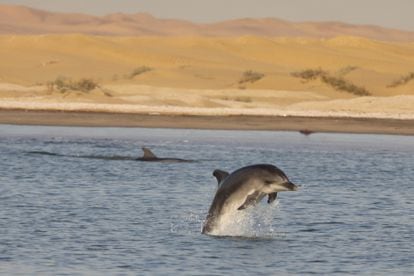Humans had always been considered more intelligent than dolphins, because while they had invented "the wheel, New York, wars and things like that", the others just frolicked in the water, explains Douglas Adams in his
Hitchhiker's Guide to the Galaxy.
.
"Conversely, dolphins have always believed they were much more intelligent than man, for precisely the same reasons," adds Adams.
In addition, as was recently known, female dolphins have clitorises as pleasurable as that of women.
And now a new source of pride is added for marine mammals, capable as they are of recognizing their friends and family by taste, a characteristic that has not yet been described in humans.
Fortunately, some will say, since dolphins recognize those close to them by tasting their urine in the water.
A team of researchers publishes a study in
Science Advances
detailing this ability of dolphins, a characteristic that has an important evolutionary path.
"It's important because dolphins are the first vertebrates to have been shown to have social recognition through taste alone" rather than the more typical sense of smell, explains lead author Jason Bruck of the University of Saint Andrews.
"This is a new concept in our understanding of taste sensory biology and highlights how little we know about this sense in general," adds this specialist in animal intelligence.
“It allows dolphins to remember others with whom they have successfully associated, important for an animal known to survive thanks to its alliances”
Jason Bruck, University of Saint Andrews
This aptitude of the dolphins does not stop there.
Because the researchers found that the eight animals with which they experimented were able to connect the taste information they received from the urine with the characteristic vocalizations of each animal.
Dolphins have a unique vocalization that defines them, an acoustic signature, a whistle that works like their name, by which the other members of the group recognize and repeat them.
Like when a person introduces herself saying her name, "Ana", and the others repeat "Ana" when they see her.
And the animals in this study identified that pee corresponds to that acoustic signature.
That is, they use the two systems to recognize each other and, more crucially, to think about each other when they are not present.
From an evolutionary perspective, it means dolphins can "mentally track other individuals, even when they're not around," explains Bruck.
“That's adaptive because it allows the dolphins to remember others they've successfully partnered with, as well as individuals they've had bad experiences with in the past.
Something important for an animal known for surviving thanks to its alliances.”
Therefore, dolphins demonstrate an extraordinarily complex intelligence: that of making plans with other companions, even when they are not present.
nosy dolphins
In addition, and this was already known, they can remember the name (the acoustic signature) of another dolphin that they have not seen, heard or tasted for 20 years.
This means that dolphins "could also be able to make references to a third dolphin, referring to dolphins
in abstentia
," Bruck proposes.
That is, they can talk about another dolphin who is not present, such as someone gossiping about someone or planning to meet a third party.
“Because dolphins can
whistle
on dolphins that are not immediately in the group at the time, you have the same potential for contemplation on people that you might have when a human says the name of another person who is not in the room,” explains the researcher, amazed by this acoustic social recognition system similar to that of humans.
A dolphin leaps out of the water off the coast of Namibia, in a file image. Tess Gridley, Namibian Dolphin Project
“It is not every day that scientists find evidence of the use of noun-like signals in a non-human vocal system.
That's pretty exciting,” he acknowledges.
Rethinking the past, imagining the future, mentally labeling another animal with the taste and sound, projecting plans, talking about others who are not present.
And without stopping playing in the seas, what would Adams say.
The researchers do not know exactly what the mechanism is that allowed the dolphins to develop this ability, but they suggest some probable theory.
Because marine mammals are animals that, after developing a life on land, decided to migrate back to the sea, exchanging one capacity for another.
“Dolphins have lost much of the brain structures around the sense of smell,” says Bruck, and yet “some pathways remain in the pathways to the brain.
These could have been co-opted by the sense of taste for this purpose.”
That is, it is possible that they swapped the brain's ability to recognize others with smell for that of taste.
And what they have more available, like dogs.
What is also not known is whether dolphins urinate with a social vocation, as dogs do on trees and lampposts.
Or if they force it, in a sense, since dolphins inspect the genital area of others.
And it is possible, Bruck acknowledges, that in doing so they give him a tap with which they claim a little urine to taste to keep their
name
From him.
You can write to
javer@esmateria.com
, follow
MATERIA
on
,
and
, or sign up to receive
our weekly newsletter
.

